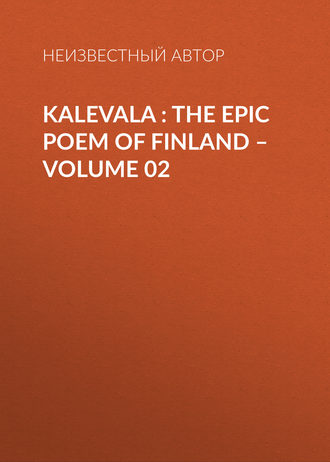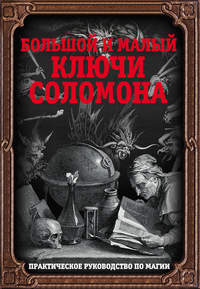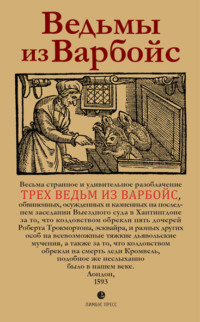Kalevala : the Epic Poem of Finland – Volume 02
 полная версия
полная версияKalevala : the Epic Poem of Finland – Volume 02
Жанр: зарубежная поэзиязарубежная классиказарубежная старинная литературастихи и поэзиясерьезное чтениеcтихи, поэзия
Язык: Английский
Год издания: 2019
Добавлена:
Настройки чтения
Размер шрифта
Высота строк
Поля
RUNE XXXVII
ILMARINEN'S BRIDE OF GOLD
Ilmarinen, metal-worker, Wept one day, and then a second, Wept the third from morn till evening, O'er the death of his companion, Once the Maiden of the Rainbow; Did not swing his heavy hammer, Did not touch its copper handle, Made no sound within his smithy, Made no blow upon his anvil, Till three months had circled over; Then the blacksmith spake as follows: "Woe is me, unhappy hero! Do not know how I can prosper; Long the days, and cold, and dreary, Longer still the nights, and colder; I am weary in the evening, In the morning still am weary, Have no longing for the morning, And the evening is unwelcome; Have no pleasure in the future, All my pleasures gone forever, With my faithful life-companion Slaughtered by the hand of witchcraft! Often will my heart-strings quiver When I rest within my chamber, When I wake at dreamy midnight, Half-unconscious, vainly searching For my noble wife departed." Wifeless lived the mourning blacksmith, Altered in his form and features; Wept one month and then another, Wept three months in full succession. Then the magic metal-worker Gathered gold from deeps of ocean, Gathered silver from the mountains, Gathered many heaps of birch-wood. Filled with faggots thirty sledges, Burned the birch-wood into ashes, Put the ashes in the furnace, Laid the gold upon the embers, Lengthwise laid a piece of silver Of the size of lambs in autumn, Or the fleet-foot hare in winter; Places servants at the bellows, Thus to melt the magic metals. Eagerly the servants labor, Gloveless, hatless, do the workmen Fan the flames within the furnace. Ilmarinen, magic blacksmith, Works unceasing at his forging, Thus to mould a golden image, Mould a bride from gold and silver; But the workmen fail their master, Faithless stand they at the bellows. Wow the artist, Ilmarinen, Fans the flame with force of magic, Blows one day, and then a second, Blows the third from morn till even; Then he looks within the furnace, Looks around the oven-border, Hoping there to see an image Rising from the molten metals. Comes a lambkin from the furnace, Rising from the fire of magic, Wearing hair of gold and copper, Laced with many threads of silver; All rejoice but Ilmarinen At the beauty of the image. This the language of the blacksmith: "May the wolf admire thy graces; I desire a bride of beauty Born from molten gold and silver!" Ilmarinen, the magician, To the furnace threw the lambkin; Added gold in great abundance, And increased the mass of silver, Added other magic metals, Set the workmen at the bellows; Zealously the servants labor, Gloveless, hatless, do the workmen Fan the flames within the furnace. Ilmarinen, wizard-forgeman, Works unceasing with his metals, Moulding well a golden image, Wife of molten gold and silver; But the workmen fail their master, Faithless do they ply the bellows. Now the artist, Ilmarinen, Fans the flames by force of magic; Blows one day, and then a second, Blows a third from morn till evening, When he looks within the furnace, Looks around the oven-border, Hoping there, to see an image Rising from the molten metals. From the flames a colt arises, Golden-maned and silver-headed, Hoofs are formed of shining copper. All rejoice but Ilmarinen At the wonderful creation; This the language of the blacksmith; "Let the bears admire thy graces; I desire a bride of beauty Born of many magic metals." Thereupon the wonder-forger Drives the colt back to the furnace, Adds a greater mass of silver, And of gold the rightful measure, Sets the workmen at the bellows. Eagerly the servants labor, Gloveless, hatless, do the workmen Fan the flames within the furnace. Ilmarinen, the magician, Works unceasing at his witchcraft, Moulding well a golden maiden, Bride of molten gold and silver; But the workmen fail their master, Faithlessly they ply the bellows. Now the blacksmith, Ilmarinen, Fans the flames with magic powers, Blows one day, and then a second, Blows a third from morn till even; Then he looks within his furnace, Looks around the oven-border, Trusting there to see a maiden Coming from the molten metals. From the fire a virgin rises, Golden-haired and silver-headed, Beautiful in form and feature. All are filled with awe and wonder, But the artist and magician. Ilmarinen, metal-worker, Forges nights and days unceasing, On the bride of his creation; Feet he forges for the maiden, Hands and arms, of gold and silver; But her feet are not for walking, Neither can her arms embrace him. Ears he forges for the virgin, But her ears are not for hearing; Forges her a mouth of beauty, Eyes he forges bright and sparkling; But the magic mouth is speechless, And the eyes are not for seeing. Spake the artist, Ilmarinen: "This, indeed, a priceless maiden, Could she only speak in wisdom, Could she breathe the breath of Ukko!" Thereupon he lays the virgin On his silken couch of slumber, On his downy place of resting. Ilmarinen heats his bath-room, Makes it ready for his service, Binds together silken brushes, Brings three cans of crystal water, Wherewithal to lave the image, Lave the golden maid of beauty. When this task had been completed, Ilmarinen, hoping, trusting, Laid his golden bride to slumber, On his downy couch of resting; Ordered many silken wrappings, Ordered bear-skins, three in number, Ordered seven lambs-wool blankets, Thus to keep him warm in slumber, Sleeping by the golden image Re had forged from magic metals. Warm the side of Ilmarinen That was wrapped in furs and blankets; Chill the parts beside the maiden, By his bride of gold and silver; One side warm, the other lifeless, Turning into ice from coldness. Spake the artist, Ilmarinen: "Not for me was born this virgin From the magic molten metals; I shall take her to Wainola, Give her to old Wainamoinen, As a bride and life-companion, Comfort to him in his dotage." Ilmarinen, much disheartened, Takes the virgin to Wainola, To the plains of Kalevala, To his brother speaks as follows: "O, thou ancient Wainamoinen, Look with favor on this image; Make the maiden fair and lovely, Beautiful in form and feature, Suited to thy years declining!" Wainamoinen, old and truthful, Looked in wonder on the virgin, On the golden bride of beauty, Spake these words to Ilmarinen: "Wherefore dost thou bring this maiden, Wherefore bring to Wainamoinen Bride of molten gold and silver? Spake in answer Ilmarinen: "Wherefore should I bring this image, But for purposes the noblest? I have brought her as companion To thy life in years declining, As a joy and consolation, When thy days are full of trouble!" Spake the good, old Wainamoinen: "Magic brother, wonder-forger, Throw the virgin to the furnace, To the flames, thy golden image, Forge from her a thousand trinkets. Take the image into Ehstland, Take her to the plains of Pohya, That for her the mighty powers May engage in deadly contest, Worthy trophy for the victor; Not for me this bride of wonder, Neither for my worthy people. I shall never wed an image Born from many magic metals, Never wed a silver maiden, Never wed a golden virgin." Then the hero of the waters Called together all his people, Spake these words of ancient wisdom: "Every child of Northland, listen, Whether poor, or fortune-favored: Never bow before an image Born of molten gold and silver: Never while the sunlight brightens, Never while the moonlight glimmers, Choose a maiden of the metals, Choose a bride from gold created Cold the lips of golden maiden, Silver breathes the breath of sorrow."RUNE XXXVIII
ILMARINEN'S FRUITLESS WOOING
Ilmarinen, the magician, The eternal metal-artist, Lays aside the golden image, Beauteous maid of magic metals; Throws the harness on his courser, Binds him to his sledge of birch-wood, Seats himself upon the cross-bench, Snaps the whip above the racer, Thinking once again to journey To the mansions of Pohyola, There to woo a bride in honor, Second daughter of the Northland. On he journeyed, restless, northward, Journeyed one day, then a second, So the third from morn till evening, When he reached a Northland-village On the plains of Sariola. Louhi, hostess of Pohyola, Standing in the open court-yard, Spied the hero, Ilmarinen, Thus addressed the metal-worker: "Tell me how my child is living, How the Bride of Beauty prospers, As a daughter to thy mother." Then the blacksmith, Ilmarinen, Head bent down and brow dejected, Thus addressed the Northland hostess: "O, thou dame of Sariola, Do not ask me of thy daughter, Since, alas I in Tuonela Sleeps the Maiden of the Rainbow, Sleeps in death the Bride, of Beauty, Underneath the fragrant heather, In the kingdom of Manala. Come I for a second daughter, For the fairest of thy virgins. Beauteous hostess of Pohyola, Give to me thy youngest maiden, For my former wife's compartments, For the chambers of her sister." Louhi, hostess of the Northland, Spake these words to Ilmarinen: "Foolish was the Northland-hostess, When she gave her fairest virgin, In the bloom of youth and beauty To the blacksmith of Wainola, Only to be led to Mana, Like a lambkin to the slaughter! I shall never give my daughter, Shall not give my youngest maiden Bride of thine to be hereafter, Life-companion at thy fireside. Sooner would I give the fair one To the cataract and whirlpool, To the river of Manala, To the waters of Tuoni!" Then the blacksmith, Ilmarinen, Drew away his head, disdainful, Shook his sable locks in anger, Entered to the inner court-room, Where the maiden sat in waiting, Spake these measures to the daughter: "Come with me, thou bright-eyed maiden, To the cottage where thy sister Lived and lingered in contentment, Baked for me the toothsome biscuit, Brewed for me the beer of barley, Kept my dwelling-place in order." On the floor a babe was lying, Thus he sang to Ilmarinen: "Uninvited, leave this mansion, Go, thou stranger, from this dwelling; Once before thou camest hither, Only bringing pain and trouble, Filling all our hearts with sorrow. Fairest daughter of my mother, Do not give this suitor welcome, Look not on his eyes with pleasure, Nor admire his form and features. In his mouth are only wolf-teeth, Cunning fox-claws in his mittens, In his shoes art only bear-claws, In his belt a hungry dagger; Weapons these of blood and murder, Only worn by the unworthy." Then the daughter spake as follows To the blacksmith, Ilmarinen: "Follow thee this maid will never, Never heed unworthy suitors; Thou hast slain the Bride of Beauty, Once the Maiden of the Rainbow, Thou wouldst also slay her sister. I deserve a better suitor, Wish a truer, nobler husband, Wish to ride in richer sledges, Have a better home-protection; Never will I sweep the cottage And the coal-place of a blacksmith." Then the hero, Ilmarinen, The eternal metal-artist, Turned his head away, disdainful, Shook his sable locks in anger, Quickly seized the trembling maiden, Held her in his grasp of iron, Hastened from the court of Louhi To his sledge upon the highway. In his sleigh he seats the virgin, Snugly wraps her in his far-robes, Snaps his whip above the racer, Gallops on the high-road homeward; With one hand the reins be tightens, With the other holds the maiden. Speaks the virgin-daughter, weeping: We have reached the lowland-berries, Here the herbs of water-borders; Leave me here to sink and perish As a child of cold misfortune. Wicked Ilmarinen, listen! If thou dost not quickly free me, I will break thy sledge to pieces, Throw thy fur-robes to the north-winds." Ilmarinen makes this answer: "When the blacksmith builds his snow-sledge, All the parts are hooped with iron; Therefore will the beauteous maiden Never beat my sledge to fragments." Then the silver-tinselled daughter Wept and wailed in bitter accents, Wrung her hands in desperation, Spake again to Ilmarinen: "If thou dost not quickly free me, I shall change to ocean-salmon, Be a whiting of the waters." "Thou wilt never thus escape me, As a pike I'll fleetly follow." Then the maiden of Pohyola Wept and wailed in bitter accents, Wrung her hands in desperation, Spake again to Ilmarinen; "If thou dost not quickly free me, I shall hasten to the forest, Mid the rocks become an ermine!" "Thou wilt never thus escape me, As a serpent I will follow." Then the beauty of the Northland, Wailed and wept in bitter accents, Wrung her hands in desperation, Spake once more to Ilmarinen: "Surely, if thou dost not free me, As a lark I'll fly the ether, Hide myself within the storm-clouds." "Neither wilt thou thus escape me, As an eagle I will follow." They had gone but little distance, When the courser shied and halted, Frighted at some passing object; And the maiden looked in wonder, In the snow beheld some foot-prints, Spake these words to Ilmarinen: Who has run across our highway?" "'Tis the timid hare", he answered. Thereupon the stolen maiden Sobbed, and moaned, in deeps of sorrow, Heavy-hearted, spake these measures: "Woe is me, ill-fated virgin! Happier far my life hereafter, If the hare I could but follow To his burrow in the woodlands! Crook-leg's fur to me is finer Than the robes of Ilmarinen." Ilmarinen, the magician, Tossed his head in full resentment, Galloped on the highway homeward, Travelled but a little distance, When again his courser halted, Frighted at some passing stranger. Quick the maiden looked and wondered, In the snow beheld some foot-prints, Spake these measures to the blacksmith: Who has crossed our snowy pathway?" "'Tis a fox", replied the minstrel. Thereupon the beauteous virgin Moaned again in depths of anguish, Sang these accents, heavy-hearted: "Woe is me, ill-fated maiden! Happier far my life hereafter, With the cunning fox to wander, Than with this ill-mannered suitor; Reynard's fur to me is finer Than the robes of Ilmarinen." Thereupon the metal-worker Shut his lips in sore displeasure, Hastened on the highway homeward; Travelled but a little distance, When again his courser halted. Quick the maiden looked in wonder, in the snow beheld some foot-prints, Spake these words to the magician: Who again has crossed our pathway?" "'Tis the wolf", said Ilmarinen. Thereupon the fated daughter Fell again to bitter weeping, And Intoned these words of sorrow: "Woe is me, a hapless maiden! Happier far my life hereafter, Brighter far would be my future, If these tracks I could but follow; On the wolf the hair is finer Than the furs of Ilmarinen, Faithless suitor of the Northland." Then the minstrel of Wainola Closed his lips again in anger, Shook his sable locks, resentful, Snapped the whip above the racer, And the steed flew onward swiftly, O'er the way to Kalevala, To the village of the blacksmith. Sad and weary from his journey, Ilmarinen, home-returning, Fell upon his couch in slumber, And the maiden laughed derision. In the morning, slowly waking, Head confused, and locks dishevelled, Spake the wizard, words as follow: "Shall I set myself to singing Magic songs and incantations? Shall I now enchant this maiden To a black-wolf on the mountains, To a salmon of the ocean? Shall not send her to the woodlands, All the forest would be frighted; Shall not send her to the waters, All the fish would flee in terror; This my sword shall drink her life-blood, End her reign of scorn and hatred." Quick the sword feels his intention, Quick divines his evil purpose, Speaks these words to Ilmarinen: "Was not born to drink the life-blood Of a maiden pure and lovely, Of a fair but helpless virgin." Thereupon the magic minstrel, Filled with rage, began his singing; Sang the very rocks asunder, Till the distant hills re-echoed; Sang the maiden to a sea-gull, Croaking from the ocean-ledges, Calling from the ocean-islands, Screeching on the sandy sea-coast, Flying to the winds opposing. When his conjuring had ended, Ilmarinen joined his snow-sledge, Whipped his steed upon a gallop, Hastened to his ancient smithy, To his home in Kalevala. Wainamoinen, old and truthful, Comes to meet him on the highway, Speaks these words to the magician: "Ilmarinen, worthy brother, Wherefore comest heavy-hearted From the dismal Sariola? Does Pohyola live and prosper? Spake the minstrel, Ilmarinen: "Why should not Pohyola prosper? There the Sampo grinds unceasing, Noisy rocks the lid in colors; Grinds one day the flour for eating, Grinds the second flour for selling, Grinds the third day flour for keeping; Thus it is Pohyola prospers. While the Sampo is in Northland, There is plowing, there is sowing, There is growth of every virtue, There is welfare never-ending." Spake the ancient Wainamoinen: "Ilmarinen, artist-brother, Where then is the Northland-daughter, Far renowned and beauteous maiden, For whose hand thou hast been absent? These the words of Ilmarinen: "I have changed the hateful virgin To a sea-gull on the ocean; Now she calls above the waters, Screeches from the ocean-islands; On the rocks she calls and murmurs Vainly calling for a suitor."RUNE XXXIX
WAINAMOINEN'S SAILING
Wainamoinen, old and faithful, Spake these words to Ilmarinen: "O thou wonder-working brother, Let us go to Sariola, There to gain the magic Sampo, There to see the lid in colors." Ilmarinen gave this answer: "Hard indeed to seize the Sampo, Neither can the lid be captured From the never-pleasant Northland, From the dismal Sariola. Louhi took away the Sampo, Carried off the lid in colors To the stone-mount of Pohyola; Hid it in the copper mountain, Where nine locks secure the treasure. Many young roots sprout around it, Grow nine fathoms deep in sand-earth, One great root beneath the mountain, In the cataract a second, And a third beneath the castle Built upon the mount of ages." Spake the ancient Wainamoinen: "Brother mine, and wonder-worker, Let us go to Sariola, That we may secure the Sampo; Let us build a goodly vessel, Bring the Sampo to Wainola, Bring away the lid in colors, From the stone-berg of Pohyola, From the copper-bearing mountain. Where the miracle lies anchored." Ilmarinen thus made answer: "By the land the way is safer, Lempo travels on the ocean, Ghastly Death upon his shoulder; On the sea the waves will drift us, And the storm-winds wreck our vessel; Then our bands must do the rowing, And our feet must steer us homeward." Spake the ancient Wainamoinen: "Safe indeed by land to journey, But the way is rough and trying, Long the road and full of turnings; Lovely is the ship on ocean, Beautiful to ride the billows, Journey easy o'er the waters, Sailing in a trusty vessel; Should the West-wind cross our pathway, Will the South-wind drive us northward. Be that as it may, my brother, Since thou dost not love the water, By the land then let us journey. Forge me now the sword of battle, Forge for me the mighty fire-sword, That I may destroy the wild-beasts, Frighten all the Northland people, As we journey for the Sampo To the cold and dismal village, To the never-pleasant Northland, To the dismal Sariola." Then the blacksmith, Ilmarinen, The eternal forger-artist, Laid the metals in the furnace, In the fire laid steel and iron, In the hot-coals, gold and silver, Rightful measure of the metals; Set the workmen at the furnace, Lustily they plied the bellows. Like the wax the iron melted, Like the dough the hard steel softened, Like the water ran the silver, And the liquid gold flowed after. Then the minstrel, Ilmarinen, The eternal wonder-forger, Looks within his magic furnace, On the border of his oven, There beholds the fire-sword forming, Sees the blade with golden handle; Takes the weapon from the furnace, Lays it on his heavy anvil For the falling of the hammer; Forges well the blade of magic, Well the heavy sword be tempers, Ornaments the hero-weapon With the finest gold and silver. Wainamoinen, the magician, Comes to view the blade of conquest, Lifts admiringly the fire-sword, Then these words the hero utters: "Does the weapon match the soldier, Does the handle suit the bearer? Yea, the blade and hilt are molded To the wishes of the minstrel." On the sword-point gleams the moonlight, On the blade the sun is shining, On the hilt the bright stars twinkle, On the edge a horse is neighing, On the handle plays a kitten, On the sheath a dog is barking. Wainamoinen wields his fire-sword, Tests it on the iron-mountain, And these words the hero utters: "With this broadsword I could quickly Cleave in twain the mount of Pohya, Cut the flinty rocks asunder." Spake the blacksmith, Ilmarinen: "Wherewith shall I guard from danger, How protect myself from evil, From the ills by land and water? Shall I wear an iron armor, Belt of steel around my body? Stronger is a man in armor, Safer in a mail of copper." Now the time has come to journey To the never-pleasant Northland; Wainamoinen, ancient minstrel, And his brother, Ilmarinen, Hasten to the field and forest, Searching for their fiery coursers, In each shining belt a bridle, With a harness on their shoulders. In the woods they find a race; In the glen a steed of battle, Ready for his master's service. Wainamoinen, old and trusty, And the blacksmith, Ilmarinen, Throw the harness on the courser, Hitch him to the sledge of conquest, Hasten on their journey Northward; Drive along the broad-sea's margin Till they bear some one lamenting On the strand hear something wailing Near the landing-place of vessels. Wainamoinen, ancient minstrel, Speaks these words in wonder, guessing, "This must be some maiden weeping, Some fair daughter thus lamenting; Let us journey somewhat nearer, To discover whence this wailing." Drew they nearer, nearer, nearer, Hoping thus to find a maiden Weeping on the sandy sea-shore. It was not a maiden weeping, But a vessel, sad, and lonely, Waiting on the shore and wailing. Spake the ancient Wainamoinen: "Why art weeping, goodly vessel, What the cause of thy lamenting? Art thou mourning for thy row-locks, Is thy rigging ill-adjusted? Dost thou weep since thou art anchored On the shore in times of trouble?" Thus the war-ship spake in answer: "To the waters would this vessel Haste upon the well-tarred rollers, As a happy maiden journeys To the cottage of her husband. I, alas! a goodly vessel, Weep because I lie at anchor, Weep and wail because no hero Sets me free upon the waters, Free to ride the rolling billows. It was said when I was fashioned, Often sung when I was building, That this bark should be for battle, Should become a mighty war-ship, Carry in my hull great treasures, Priceless goods across the ocean. Never have I sailed to conquest, Never have I carried booty; Other vessels not as worthy To the wars are ever sailing, Sailing to the songs of battle. Three times in the summer season Come they home with treasures laden, In their hulls bring gold and silver; I, alas! a worthy vessel, Many months have lain at anchor, I, a war-ship well constructed, Am decaying in the harbor, Never having sailed to conquest; Worms are gnawing at my vitals, In my hull their dwelling-places, And ill-omened birds of heaven Build their nests within my rigging; Frogs and lizards of the forest Play about my oars and rudder; Three times better for this vessel Were he but a valley birch-tree, Or an aspen on the heather, With the squirrels in his branches, And the dogs beneath them barking!" Wainamoinen, old and faithfull Thus addressed the ship at anchor: "Weep no more, thou goodly vessel, Man-of-war, no longer murmur; Thou shalt sail to Sariola, Sing the war-songs of the Northland, Sail with us to deadly combat. Wert thou built by the Creator, Thou canst sail the roughest waters, Sidewise journey o'er the ocean; Dost not need the hand to touch thee, Dost not need the foot to turn thee, Needing nothing to propel thee." Thus the weeping boat made answer: "Cannot sail without assistance, Neither can my brother-vessels Sail unaided o'er the waters, Sail across the waves undriven." Spake the ancient Wainamoinen: "Should I lead thee to the broad-sea, Wilt thou journey north unaided, Sail without the help of rowers, Sail without the aid of south-winds, Sail without the b elm to guide thee? Thus the wailing ship replying: Cannot sail without assistance, Neither can my brother-vessels Sail without the aid of rowers, Sail without the help of south-winds, Nor without the helm to guide them." These the words of Wainamoinen: "Wilt thou run with aid of oarsmen When the south-winds give assistance, Guided by a skillful pilot?" This the answer of the war-ship: "Quickly can I course these waters, When my oars are manned by rowers, When my sails are filled with south-winds, All my goodly brother-vessels Sail the ocean with assistance, When the master holds the rudder." Then the ancient Wainamoinen Left the racer on the sea-side, Tied him to the sacred birch-tree, Hung the harness on a willow, Rolled the vessel to the waters, Sang the ship upon the broad-sea, Asked the boat this simple question: "O thou vessel, well-appearing From the mighty oak constructed, Art thou strong to carry treasures As in view thou art commanding? Thus the goodly ship made answer: "Strong am I to carry treasures, In my hull a golden cargo; I can bear a hundred oarsmen, And of warriors a thousand." Wainamoinen, the magician, Then began his wondrous singing. On one side the magic vessel, Sang he youth with golden virtues, Bearded youth with strength of heroes, Sang them into mail of copper. On the other side the vessel, Sang he silver-tinselled maidens, Girded them with belts of copper, Golden rings upon their fingers. Sings again the great magician, Fills the magic ship with heroes, Ancient heroes, brave and mighty; Sings them into narrow limits, Since the young men came before them. At the helm himself be seated, Near the last beam of the vessel, Steered his goodly boat in joyance, Thus addressed the willing war-ship: "Glide upon the trackless waters, Sail away, my ship of magic, Sail across the waves before thee, Speed thou like a dancing bubble, Like a flower upon the billows!" Then the ancient Wainamoinen Set the young men to the rowing, Let the maidens sit in waiting. Eagerly the youthful heroes Bend the oars and try the row-locks, But the distance is not lessened. Then the minstrel, Wainamoinen, Set the maidens to the rowing, Let the young men rest in waiting. Eagerly the merry maidens Bend the aspen-oars in rowing, But the distance is not lessened. Then the master, Wainamoinen, Set the old men to the rowing, Let the youth remain in waiting. Lustily the aged heroes Bend and try the oars of aspen, But the distance is not lessened. Then the blacksmith, Ilmarinen, Grasped the oars with master-magic, And the boat leaped o'er the surges, Swiftly sped across the billows; Far and wide the oars resounded, Quickly was the distance lessened. With a rush and roar of waters Ilmarinen sped his vessel, Benches, ribs, and row-locks creaking, Oars of aspen far resounding; Flap the sails like wings of moor-cocks, And the prow dips like a white-swan; In the rear it croaks like ravens, Loud the oars and rigging rattle. Straightway ancient Wainamoinen Sitting by the bending rudder, Turns his magic vessel landward, To a jutting promontory, Where appears a Northland-village. On the point stands Lemminkainen, Kaukomieli, black magician, Ahti, wizard of Wainola, Wishing for the fish of Pohya, Weeping for his fated dwelling, For his perilous adventures, Hard at work upon a vessel, On the sail-yards of a fish-boat, Near the hunger-point and island, Near the village-home deserted. Good the ears of the magician, Good the wizard's eyes for seeing; Casts his vision to the South-east, Turns his eyes upon the sunset, Sees afar a wondrous rainbow, Farther on, a cloudlet hanging; But the bow was a deception, And the cloudlet a delusion; 'Tis a vessel swiftly sailing, 'Tis a war-ship flying northward, O'er the blue-back of the broad-sea, On the far-extending waters, At the helm the master standing, At the oars a mighty hero. Spake the reckless Lemminkainen: "Do not know this wondrous vessel, Not this well-constructed war-ship, Coming from the distant Suomi, Rowing for the hostile Pohya." Thereupon wild Lemminkainen Called aloud in tones of thunder O'er the waters to the vessel; Made the distant hills re-echo With the music of his calling: "Whence this vessel on the waters, Whose the war-ship sailing hither?" Spake the master of the vessel To the reckless Lemminkainen: "Who art thou from fen or forest, Senseless wizard from the woodlands, That thou dost not know this vessel, Magic war-ship of Wainola? Dost not know him at the rudder, Nor the hero at the row-locks?" Spake the wizard, Lemminkainen: "Well I know the helm-director, And I recognize the rower; Wainamoinen, old and trusty, At the helm directs the vessel; Ilmarinen does the rowing. Whither is the vessel sailing, Whither wandering, my heroes? Spake the ancient Wainamoinen: "We are sailing to the Northland, There to gain the magic Sampo, There to get the lid in colors, From the stone-berg of Pohyola, From the copper-bearing mountain." Spake the evil Lemminkainen: "O, thou good, old Wainamoinen, Take me with thee to Pohyola, Make me third of magic heroes, Since thou goest for the Sampo, Goest for the lid in colors; I shall prove a valiant soldier, When thy wisdom calls for fighting; I am skilled in arts of warfare!" Wainamoinen, ancient minstrel, Gave assent to Ahti's wishes; Thereupon wild Lemminkainen Hastened to Wainola's war-ship, Bringing floats of aspen-timber, To the ships of Wainamoinen. Thus the hero of the Northland Speaks to reckless Lemminkainen: "There is aspen on my vessel, Aspen-floats in great abundance, And the boat is heavy-laden. Wherefore dost thou bring the aspen To the vessel of Wainola?" Lemminkainen gave this answer: "Not through caution sinks a vessel, Nor a hay-stack by its proppings; Seas abound in hidden dangers, Heavy storms arise and threaten Fell destruction to the sailor That would brave the angry billows." Spake the good, old Wainamoinen: "Therefore is this warlike vessel Built of trusty steel and copper, Trimmed and bound in toughest iron, That the winds may, not destroy it, May not harm my ship of magic."








